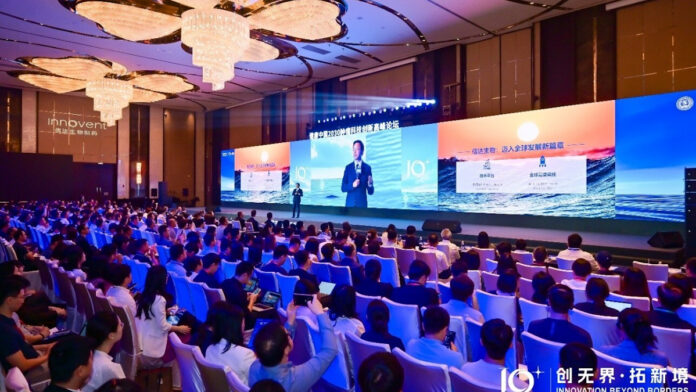Innovent Biologics, Inc., which develops, manufactures, and commercialises medicines for the treatment of oncology, autoimmune, cardiovascular and metabolic, ophthalmology, and other major diseases, held its Oncology R&D Day, unveiling its forward-looking strategy centred on dual innovation in next-generation immuno-oncology (IO) and antibody-drug conjugate (ADC) technologies.
The event drew more than 500 participants, including oncology key opinion leaders (KOLs), principal investigators, analysts, and global investors.
“Over the past decade, Innovent has been at the forefront of China’s biopharmaceutical evolution—pioneering the PD-1 immunotherapy era and building China’s leading oncology brand, with over 3 million cancer patients treated with our therapies,” said Michael Yu, founder, chairman of the board and CEO of Innovent.
“We are entering a new chapter focused on global innovation, powered by a robust pipeline and dual innovation of next-generation IO and next-generation ADC. Our recent presence at the 2025 ASCO with eight oral presentations highlights the strength and global competitiveness of our R&D. But this is only the beginning. With a clear vision to advance at least five pipeline assets into MRCT Phase 3 by 2030, we are committed to delivering innovative, high-quality, and accessible cancer treatments to patients worldwide.”
At the core of Innovent’s oncology strategy lies the dual engines of next-generation immunotherapy (IO) and next-generation antibody-drug conjugates (ADC), supported by insights in cancer biology and differentiated technology platforms.
“We are harnessing deep cancer biology insights, advanced antibody and protein engineering, and differentiated ADC linker-payload technologies to develop broader-spectrum, more potent, and less toxic therapies aimed at transforming the oncology treatment paradigm,” said Zhou Hui, SVP of Innovent Oncology R&D.
“Our strategy is designed to target some of the toughest challenges in cancer care, including drug resistance, cold tumours, and improve the efficacy of current IO treatment, while bringing new hope to patients worldwide.”
Innovent’s pipeline is guided by a phased IO+ADC combination strategy designed to address tumour heterogeneity and immune escape, evolving through three stages: Next-gen IO + Chemotherapy: to redefine the IO cornerstone; Next-gen IO + mAb-ADC / bispecific ADC: to cover expansive tumour types and treatment lines; and Next-gen IO + Dual-Payload ADC (dpADC): to unlock full potential of IO+ ADC synergy, and reshape cancer treatment.
Currently its oncology pipeline features nearly 10 next-generation molecules in global development, with multi-regional trials actively underway in the US, EU, and Asia. The company also continues to invest in global R&D infrastructure, supported by R&D hubs in Shanghai and San Francisco and antibody and ADC manufacturing capacity exceeding 140,000L. Innovent is expanding its global innovation footprint, with a 2030 goal to advance at least five pipeline assets into global MRCT phase 3 trials.
Key potential candidates include:
IBI343: innovative CLDN18.2 ADC with site-specific conjugation and a TOPO1 inhibitor payload, demonstrating significant survival benefits in both GC and PDAC
IBI363: PD-1/IL-2α-bias fusion protein as next-gen IO to redefine cancer treatment and expand the boundaries of IO responsiveness
IBI3009: DLL3 ADC in collaboration with Roche
IBI3003: tri-specific T-cell engager targeting BCMA/GPRC5D/CD3 for multiple myeloma
IBI3001: EGFR/B7H3 ADC with two synergetic targets covering multiple potential indications
IBI3020: CEACAM5 dual-payload ADC as globally the first to enter clinical phase
IBI363: Next-Gen IO redefining cancer immunotherapy
IBI363 is a global first-in-class PD-1/IL-2α-bias fusion protein, featuring a differentiated molecular design and a dual immune activation mechanism.
At ASCO 2025, IBI363 demonstrated breakthrough potential in three hard-to-treat tumour types, with a long tailing effect in prolonged survival benefits:
Immune-resistant NSCLC (squamous & adeno): boosted response rate and extended PFS reflects strong immune activation; median overall survival (mOS) up to 17.5 months in 1.5 mg dose cohorts, 12-month OS rate exceeding 70% for 3 mg dose cohorts, and benefit observed even in PD-L1 low expressers
Later-line CRC (3L+): mOS of 16.1 months in monotherapy and only 17.8% OS events occurred in combination with bevacizumab with 9.4 months follow-up, outperforming historical benchmarks
Immune-resistant melanoma (mucosal/acral subtypes): confirmed overall response rate (cORR) 23%, median duration of response (mDoR) 14 months, and median OS 14.7 months, showing unprecedented positive response and a long-lasting immunologic tailing effect
With two Breakthrough Therapy Designations from the NMPA CDE, two Fast Track Designations from the FDA, IBI363 is advancing rapidly toward registrational development. The first head-to-head trial vs. pembrolizumab in mucosal and acral melanoma was initiated. Meanwhile, IBI363 is in preparation for registrational trails in IO-treated squamous NSCLC, and third-line MSS colorectal cancer. Additional trials for first-line and other solid tumours also under exploration in ongoing PoC studies.
Innovent is advancing its next-gen ADC pipeline, including:
IBI343 (CLDN18.2 ADC): first in PDAC to demonstrate long-term survival benefits (mOS 12.1 months in 2L)
IBI3001 (EGFR/B7H3 ADC): dual-targeted ADC with broad potential in solid tumours
IBI3020 (CEACAM5 dual payload ADC): designed for high efficacy and low toxicity in treatment-resistant tumours
Innovent Academy is the company’s discovery engine for driving global innovation. The Academy continues to expand its platforms in IO, ADC, T-cell engagers, and cytokines to generate six to eight novel molecules per year.
Specifically, for next-gen IO and next-gen ADC dual upgradation, Innovent Academy focuses on diversified antitumour mechanisms to integrate TME modulation and optimize IO efficacy; and dual targeting approaches to overcome tumour heterogeneity and drug resistance.
Oncology KOLs and principal investigators (PIs) delivered keynote speeches. They emphasised that China’s innovation, which is driven by rising translational capabilities, expanding global talent pools, and patient-centric trial execution, has entered a “Deepseek” moment, one where Chinese-discovered drugs can lead global standards, not just follow them.
Jim Cornall is editor of Deeptech Digest and publisher at Ayr Coastal Media. He is an award-winning writer, editor, photographer, broadcaster, designer and author. Contact Jim here.


